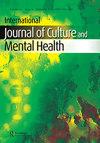对精神障碍的认识对印度首次发作精神病的精神护理途径的影响
Q1 Social Sciences
International Journal of Culture and Mental Health
Pub Date : 2018-07-03
DOI:10.1080/17542863.2017.1376104
引用次数: 8
摘要
除了精神卫生服务的可获得性,非精神卫生保健提供者(HCPs)的作用和患者/照顾者的求助行为是早期参与精神卫生服务途径的重要决定因素。我们探讨了151名首发非情感性精神病患者的求助行为,了解他们与不同类型的hcp接触/咨询的偏好;以及HCPs在使用世界卫生组织改进的会诊形式的精神病转诊中的作用。第一和随后的hcp最常见的类型是信仰治疗师,其次是当地医生、普通医生和精神卫生专业人员。到达研究中心前的平均接触次数为7.19次。转介学习中心的主要是社区内的重要人士/团体。随后的精神病学治疗路径图是复杂和多向的,没有明确的hcp等级模式,并由信仰治疗师/当地从业者主导。鉴于信仰治疗师/本地从业员是路径中主要的医护人员类型,而非医护人员的个人/组织是转介到研究中心的最常见来源,作者主张对非精神科医护人员和非医护人员的个人/组织进行最少的心理健康培训。本文章由计算机程序翻译,如有差异,请以英文原文为准。
The impact of awareness of psychotic disorder on pathways to psychiatric care for first episode psychosis in India
ABSTRACT Besides the availability of mental health services, the role of non-psychiatric healthcare providers (HCPs) and help seeking behaviour of patients/caregivers are important determinants of the pathway for early engagement with psychiatric services. We explored the help seeking behaviour of 151 persons with first episode non-affective psychosis for their preferences for making contacts/consultations with various types of HCPs; and the role of HCPs in psychiatric referrals using a modified encounter form of the World Health Organization. The most common type of the first and subsequent HCPs were faith healers, followed by local practitioners, general medical practitioners and mental health professionals. The average number of contacts before reaching the study centre was 7.19. Study centre referral was mainly by significant individuals/organizations in the community. The consequent pathway map of the pathway to psychiatric care was complex and multidirectional without a definite pattern of hierarchy of HCPs and was dominated by faith healers/local practitioners. In view of faith healers/local practitioners being the main type of HCPs in the pathway, and the non-HCPs individual/organizations being the most common referral source to study centre, the authors’advocate minimal mental health training of non-psychiatrist HCPs and non-HCPs individuals/organizations.
求助全文
通过发布文献求助,成功后即可免费获取论文全文。
去求助
来源期刊

International Journal of Culture and Mental Health
Social Sciences-Cultural Studies
CiteScore
2.10
自引率
0.00%
发文量
0
期刊介绍:
This title has ceased (2018). This important peer-review journal provides an innovative forum, both international and multidisciplinary, for addressing cross-cultural issues and mental health. Culture as it comes to bear on mental health is a rapidly expanding area of inquiry and research within psychiatry and psychology, and other related fields such as social work, with important implications for practice in the global context. The journal is an essential resource for health care professionals working in the field of cross-cultural mental health.Readership includes psychiatrists, psychologists, medical anthropologists, medical sociologists, psychiatric nurses and social workers, general practitioners and other mental health professionals interested in the area. The International Journal of Culture and Mental Health publishes original empirical research, review papers and theoretical articles in the fields of cross-cultural psychiatry and psychology. Contributions from the fields of medical anthropology and medical sociology are particularly welcome. A continuing dialogue between members of various disciplines in various fields is encouraged. The aim of the journal is to encourage its readers to think about various issues which have clouded cross-cultural development of ideas. The journal lays special emphasis on developing further links between medical anthropology, medical sociology, clinical psychiatry and psychology, and implications of the findings on service provisions. The journal is published four times a year. The style of reference is Harvard. All research articles in this journal, including those in special issues, special sections or supplements, have undergone rigorous peer review, based on initial editor screening and anonymized refereeing by at least two independent referees.
 求助内容:
求助内容: 应助结果提醒方式:
应助结果提醒方式:


